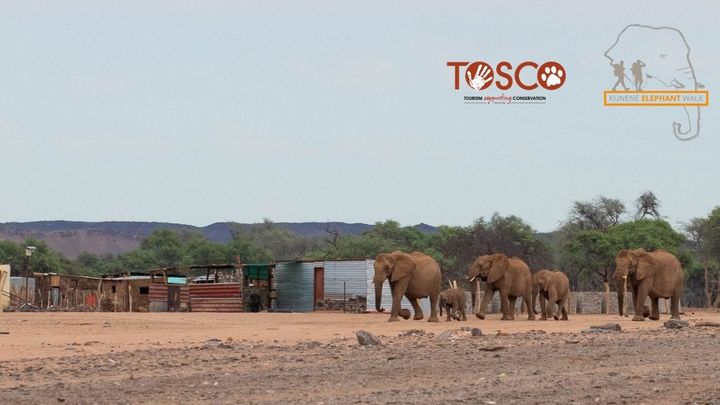
Namibia: Walking for Elephants
Donation protected
Desert-adapted elephants: A unique population of elephants in northwest Namibia
The northwest of Namibia is home to a unique group of African bush elephants (Loxodonta africana). Over many years they have adapted to the arid environment of the Namib desert. Apart from this group of desert-adapted elephants, it is only in Mali where they can be found, in the Sahara desert. In Namibia, they reside in the Hoarusib, Hoanib, Huab, Aba Huab, and Ugab ephemeral rivers, which run from the Great Escarpment into the Atlantic ocean. Compared to other African bush elephants, desert-adapted elephants can survive without drinking water for several days, and they can travel over long distances to find water. They live in smaller herds, putting less pressure on their food and water sources. Besides adaptations to cope with water and food scarcity, desert-adapted elephants also have physical adaptations to the arid environment, such as a smaller body mass and larger feet, making it easier to walk through the sand.
Threats to Namibia’s desert-adapted elephants
These desert-adapted elephants are very few in number (less than 150) and are under tremendous pressure from habitat loss and the associated problems of human-elephant conflict (HEC). To handle the effects of climate change and prolonged droughts, local communities increasingly use crop farming as an additional source of livelihood, as it reduces their dependency on livestock farming for food security. However, elephants' destruction of these crops has become a common issue as well as damages to water infrastructure in their desperate search for water. This often leads to HEC, where people take retaliatory measures. On the other hand, out of fear for elephants or misinterpreting their signs, people can react in such a way that causes elephants to get aggressive.
The loss of every individual elephant can have long-term consequences. For example, when older females (matriarchs) are killed, it affects the entire herd, often leading to the loss of the baby elephants, disruption of social dynamics, as well as that of valuable "herd memory", for example, the knowledge of food and water sources in a vast desert environment. Similarly, the loss of older males in a herd can mean that there is no male of reproductive age available when a female comes into estrus, which threatens the reproduction of the species. This population is important in its own right as a part of Namibia's biodiversity heritage; it is also essential to tourism. If concerted efforts are not applied to prevent further human-elephant conflict, which often leads to the mortality of these elephants, their future fate is in danger.
Conserving Namibia’s desert-adapted elephant through mitigating Human-Elephant Conflict
With the support of conservation NGOs and the Ministry of Environment, Forestry and Tourism (MEFT), rural communities use different techniques to mitigate human-elephant conflict. The Kunene Elephant Walk is one of the NGOs that aims to support communities in addressing HEC and raise awareness and funds to implement the following HEC mitigation projects:
- Protection walls around gardens to protect crops, such as chili fences, electric fences, and sharp stones walls;
- Construction of additional water points away from villages to reduce damage from elephants seeking water;
- Capacity building of community members as elephant guards, who help increase the understanding within their communities on elephants, their behavior, and how to respond to them safely.
The Kunene Elephant Walk initiative
The Kunene Elephant Walk (KEW) is an initiative by John K. Kasaona that aims to help conserve the unique population of desert-adapted elephants by raising awareness about the ecological and economic importance of desert-adapted elephants on a local, national and international level while raising funds for conflict prevention projects.
The raised funds will be used for various conflict prevention projects in the conservancies that are within the elephant habitat in this region, such as:
- Construction of additional water points for elephants outside villages;
- Construction of protective walls around communal crop gardens;
- Training of community game guards;
- Field equipment for ten elephant guards (binoculars, cameras, and uniforms).
By walking a distance of 150 kilometers through northwest conservancies that cover important elephant habitats, the KEW team aims to raise awareness of the ecological importance of desert-adapted elephants to raise funds for HEC mitigation projects and contribute to the conservation of this unique population of elephants. The Walk, initiated by John K. Kasaona in partnership with TOSCO, Desert Elephant Conservation, EHRA and the Conservation Film Foundation will start on 16June 2022 over 5 days, and is open to anyone that wants to participate and help raise awareness.
Our goal with this fundraiser is to reach N$ 400,000 (€22,300) that will be spent on various projects that aim to mitigate human-elephant conflict and promote co-existence between elephants and rural communities:
- Construction of 15 water points at various conflict hotspots in the Kunene region (N$50,000 = €2,800 per water point)
- Construction of protective walls around 50 communal crop gardens (N$20,000 = €1,200 per garden)
- Training of three elephant guards in 8 conservancies (N$1,000 = €55 per training) Total: N$24,000 = €1,330
- Kunene Elephant walk logistics (N$17,800 = €990)
- Field equipment for 10 Kunene Elephant Walk guards (Total = N$81,000 €4,500)
- 10 binoculars cost N$10,000 = €555,
- 10 cameras cost (N$69,000 = €3,830),
- 10 full uniforms for elephant guards cost (N$ 20,000 = €1200)
By donating to this cause, you will help conserve a unique population of elephants in Africa. No donation is too small, any of your chosen amount will help make a difference!
Fundraising team (8)
Josephine Kamelo
Organizer
Portieux
Nina Mensing
Team member
Raised €145 from 2 donations
Gudrun Theile
Team member
Raised €30 from 1 donation
Alina Vogel
Team member
Raised €20 from 1 donation
Frode Stang
Team member


